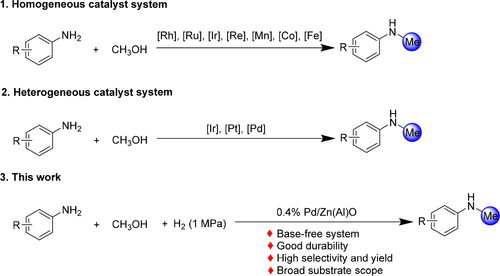Abstract
Selective N-methylation of amines with methanol is an important reaction in the synthesis of high-value-added fine chemicals, including dyes, surfactants, pharmaceuticals, agrochemicals, and materials. However, N-methylated amines possess higher reactivities and are prone to further transform into N,N-dimethylated amines. Therefore, it is still a challenge to controllably regulate the selectivity of N-methylation using heterogeneous catalysts without the use of base. Herein, we developed a series of Pd/Zn(Al)O catalysts with abundant basic sites, and the selectivity of N-methylation was controlled by a heterogeneous Pd/Zn(Al)O catalyst with a Zn/Al ratio of 10 and a Pd loading of 0.4 wt % in the pressure of H2. The experimental results showed that the appropriate basic properties of the catalyst were beneficial to form the desired N-methylated amine. The low loading of Pd in the catalyst was highly dispersed on the support, providing sufficient active sites. These were attributed to the Zn vacancies formed by Al-doped Zn, which were beneficial to form the highly active and stable Pd sites. Furthermore, a series of amines and nitrobenzenes with different functional groups were well tolerated for the selective synthesis of N-methylated amines in the absence of base.

Keywords Plus:N-METHYLATIONARYL CHLORIDESANILINESMONOMETHYLATIONFORMALDEHYDENITROARENESLATTICECO2
Published in JOURNAL OF ORGANIC CHEMISTRY,DOI10.1021/acs.joc.2c02294,JAN 2023


